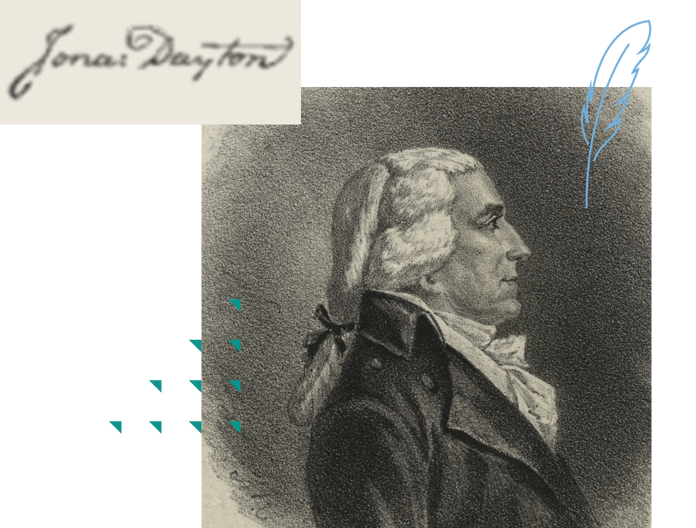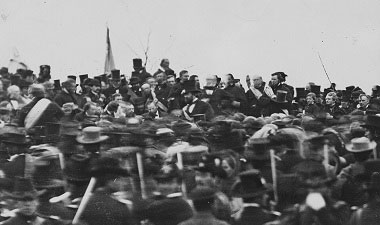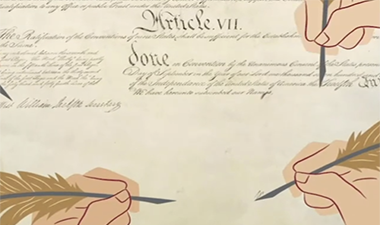Summary
Jonathan Dayton was the youngest delegate at the Constitutional Convention, and he supported special protections against the larger states. He later served as Speaker of the House and in the Senate.
Jonathan Dayton | Signer of the Constitution
3:15
Biography
Jonathan Dayton was born in New Jersey in 1760, the son of Elias Dayton, a merchant involved in both local and state politics and a veteran of the French and Indian War. Dayton was given a good education. He attended a local academy where his classmate was Alexander Hamilton and went on to graduate from the College of New Jersey [later Princeton] in the same year the Declaration of Independence was signed. Although he was not yet 16 when he finished college, he enlisted in the Continental Army. He saw combat in many of the major battles, including Brandywine Creek and Germantown. He was briefly a prisoner of New Jersey Loyalists but was released in time to take part in the Battle of Yorktown. At 19, he was made a Captain. His military service entitled him to membership in the Society of the Cincinnati, the elite veterans association created by General Henry Knox for Revolutionary war officers and their male descendants.
After the war, Dayton pursued law and set up a practice in New Jersey. He also engaged in land speculation and politics. He served in his state assembly in 1786 and 1787 and, at the age of 26, he was chosen as one of four New Jersey delegates to the Constitutional Convention. Dayton was aware that he had not been among the first choices for membership in the delegation and that he was likely to be the youngest man at the convention. Writing to fellow delegate David Brearley on June 7, 1787, he assured the older man that “all that diffidence with which the consciousness of my youth and inexperience as well as inability to discharge so important a trust, cannot but impress me.”
For his part, Brearley was eager for Dayton to arrive. The convention, he explained, had under consideration a number of “very important propositions” that needed attention. But Dayton did not reach the convention until June 21. Here, despite his declared sense of inadequacy, he spoke up on several occasions. His major concern, like the major concern of most small state delegates, was to support special protection against the power of the larger states. He also opposed counting slaves in determining a state’s representation in the House, believing rightly that the 3/5 compromise enhanced the power of the Southern states. And although he believed the new government should protect individual rights, he did not wish to see broad freedoms result in a challenge to the existing social hierarchy in America. Despite any dissatisfaction with the constitution, Jonathan Dayton added his signature to it.
Dayton focused on state politics after the Convention, serving on the New Jersey council and as speaker of the state assembly. It wasn’t until 1791 that he entered the U.S. House of Representatives where he served for eight years and was Speaker in the Fourth and Fifth Congresses. He voted as a loyal Federalist, voting for his old classmate Hamilton’s fiscal policies, approving the suppression of the Whiskey Rebellion, and endorsing Jay’s Treaty. He became a Senator in 1799, and though he remained a Federalist he did support the expansion of territory made possible by Jefferson’s Louisiana Purchase because of his own investment in western lands. In fact, Dayton would eventually own almost a quarter of a million acres in the Ohio valley.
Dayton’s land speculation made him a wealthy man, but in 1806, his interest in the west proved his political undoing. He had previously lent money to his college classmate Aaron Burr and thus became associated with Burr’s conspiracy to detach what were then the western states, combine them with Louisiana, and establish a new and independent republic. When Burr was arrested in 1807, charges were also brought against Dayton. Although Dayton was exonerated, his national political career was at an end.
In 1824, Dayton hosted the Marquis de Lafayette when he arrived in New Jersey as part of his triumphal tour. Perhaps Dayton’s excitement and exertion around this event played a role in his death later that year at the age of 63.








